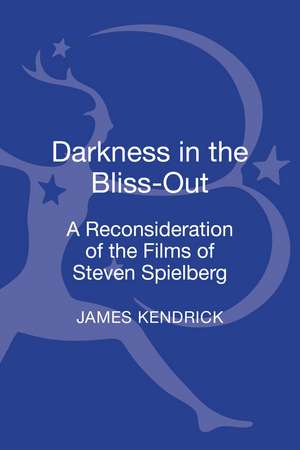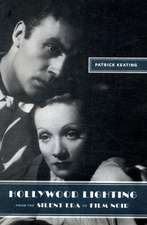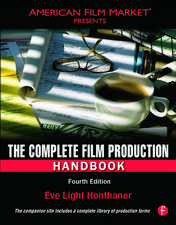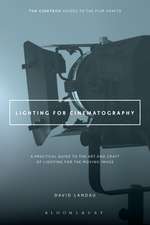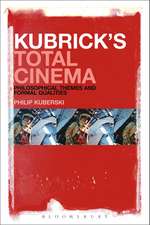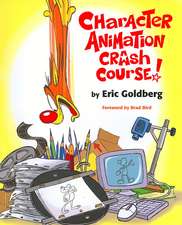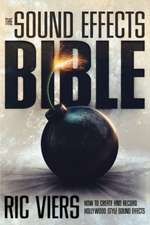Darkness in the Bliss-Out: A Reconsideration of the Films of Steven Spielberg
Autor James Kendricken Limba Engleză Hardback – 2 iul 2014
| Toate formatele și edițiile | Preț | Express |
|---|---|---|
| Paperback (1) | 192.30 lei 6-8 săpt. | |
| Bloomsbury Publishing – 2 iul 2014 | 192.30 lei 6-8 săpt. | |
| Hardback (1) | 714.92 lei 6-8 săpt. | |
| Bloomsbury Publishing – 2 iul 2014 | 714.92 lei 6-8 săpt. |
Preț: 714.92 lei
Preț vechi: 914.87 lei
-22% Nou
Puncte Express: 1072
Preț estimativ în valută:
136.84€ • 148.69$ • 115.02£
136.84€ • 148.69$ • 115.02£
Carte tipărită la comandă
Livrare economică 21 aprilie-05 mai
Preluare comenzi: 021 569.72.76
Specificații
ISBN-13: 9781441188953
ISBN-10: 1441188959
Pagini: 248
Ilustrații: 25 bw illus
Dimensiuni: 152 x 229 x 23 mm
Greutate: 0.5 kg
Ediția:New.
Editura: Bloomsbury Publishing
Colecția Bloomsbury Academic
Locul publicării:New York, United States
ISBN-10: 1441188959
Pagini: 248
Ilustrații: 25 bw illus
Dimensiuni: 152 x 229 x 23 mm
Greutate: 0.5 kg
Ediția:New.
Editura: Bloomsbury Publishing
Colecția Bloomsbury Academic
Locul publicării:New York, United States
Caracteristici
Provides an alternate lens for understanding one of the most popular filmmakers in the history, who is usually seen as sentimental and simplistic
Notă biografică
James Kendrick is an Associate Professor of Film and Digital Media at Baylor University, USA. He is the author of Hollywood Bloodshed: Violence in 1980s American Cinema (2009) and Film Violence: History, Ideology, Genre (2009), as well as numerous book chapters and journal articles. He is also the film and video critic for QNetwork.com.
Cuprins
PrefaceIntroduction-Steven Spielberg and the Politics of BlissChapter 1-'I Didn't Want to See This': Weekend America and Its Discontents in Close Encounters of the Third Kind, E.T., and PoltergeistChapter 2-'Americans Fighting Americans': Incoherence and Animal Comedy in 1941Chapter 3-'What Exactly Are We Applauding?' Indiana Jones and the Ideologies of Heroism and American ExceptionalismChapter 4-'Lost and Done For:' The Rejection of War Fantasies in Empire of the Sun and War HorseChapter 5-'For the World's More Full of Weeping Than You Can Understand': Humanity and Inhumanity in A.I. Artificial IntelligenceWorks CitedIndex
Recenzii
James Kendrick is that rare critic who sees and understands the dark side of Steven Spielberg's films. Kendrick perceptively explores the ways that Spielberg has grappled in film with the nature of human suffering and with personal and historical trauma. Kendrick reveals a depth of complexity in the films that challenges the popular understanding of Spielberg as being mainly a director of popcorn movies.
This is a necessary book - I would say indispensable to Spielberg studies. The book develops the current burgeoning critical mass of scholarly writings on Spielberg in new ways, and is a timely addition to the field. Kendrick is an elegant writer, has grounded his persuasive close readings in a thorough account of film historical and critical contexts, and presents his case with due scholarly rigor.
"By reinterpreting a significant number of Spielberg's films, James Kendrick has convincingly argued that dark, unsettling themes and tones permeate his entire output, not just his more 'serious' films such as Schindler's List or Amistad. This book is an important, thought-provoking addition to the growing film studies scholarship devoted to Spielberg."
Taking a fresh and original approach to many Spielberg films that have been scorned or misunderstood, such as the great A. I. and the flawed but fascinating 1941, James Kendrick concentrates on the dark side of Spielberg that only began to be seriously noticed after Schindler's List. In this lively, insightful, provocative study, Kendrick demolishes the conventional wisdom of Spielberg's detractors, showing how ridiculously misguided many of them are, and challenges those of us who have written more favorably on this great director to reconsider or deepen our positions. A major advance in the field of Spielberg studies.
Kendrick's book is that rare thing: eminently readable, yet suitably academic. He does not just cover well-travelled ground but examines marginalised, if not underappreciated, works in the Spielberg canon, thus offering something new for contemplation and analysis . . . This is refreshing, thought-provoking criticism.
James Kendrick's 'reconsideration' of Steven Spielberg's directorial output invites readers to 'move past comfortable surfaces' to the films' 'more disturbing and unsettling aspects.' Sensitive textual analysis of selected examples identifies, explores, and explains troubling themes recurrent across Spielberg's work, while refusing to fall back on received critical opinion. Kendrick's clear, accessible opening eases from personal response into impressively concise treatment of elements of film history and theory that have conventionally defined Spielberg's status and reputation. Authoritative examination of a range of approaches, including biography and aesthetics, sociology of suburbia, narrative structure, and Jungian patterns, amounts to a provocation of Spielberg's diehard critics. Kendrick's offering is highly recommended to readers within film and cultural studies and beyond. It digs out powerful evidence of filmmaking that is complex and knowing in its engagement with the full spectrum of experience.
Rather than repeat the traditional criticism that Spielberg's films are upbeat crowd pleasers, Kendrick presents a solid confirmation that the "darkness" more obvious in Schindler's List and Munich, in Lincoln and Amistad, was present in films as early as Sugarland Express and Jaws [.]This treatment establishes that the auteur is more than an audience pleaser, not just another pretty face. In his pre-publication review of this book, Nigel Morris, author of The Cinema of Steven Spielberg: Empire of Light, suggests that Kendrick's "see-agains" moves him into the audience of elite moviegoers. Summing Up: Highly recommended. Upper-division undergraduates, graduate students, general readers.
This is a necessary book - I would say indispensable to Spielberg studies. The book develops the current burgeoning critical mass of scholarly writings on Spielberg in new ways, and is a timely addition to the field. Kendrick is an elegant writer, has grounded his persuasive close readings in a thorough account of film historical and critical contexts, and presents his case with due scholarly rigor.
"By reinterpreting a significant number of Spielberg's films, James Kendrick has convincingly argued that dark, unsettling themes and tones permeate his entire output, not just his more 'serious' films such as Schindler's List or Amistad. This book is an important, thought-provoking addition to the growing film studies scholarship devoted to Spielberg."
Taking a fresh and original approach to many Spielberg films that have been scorned or misunderstood, such as the great A. I. and the flawed but fascinating 1941, James Kendrick concentrates on the dark side of Spielberg that only began to be seriously noticed after Schindler's List. In this lively, insightful, provocative study, Kendrick demolishes the conventional wisdom of Spielberg's detractors, showing how ridiculously misguided many of them are, and challenges those of us who have written more favorably on this great director to reconsider or deepen our positions. A major advance in the field of Spielberg studies.
Kendrick's book is that rare thing: eminently readable, yet suitably academic. He does not just cover well-travelled ground but examines marginalised, if not underappreciated, works in the Spielberg canon, thus offering something new for contemplation and analysis . . . This is refreshing, thought-provoking criticism.
James Kendrick's 'reconsideration' of Steven Spielberg's directorial output invites readers to 'move past comfortable surfaces' to the films' 'more disturbing and unsettling aspects.' Sensitive textual analysis of selected examples identifies, explores, and explains troubling themes recurrent across Spielberg's work, while refusing to fall back on received critical opinion. Kendrick's clear, accessible opening eases from personal response into impressively concise treatment of elements of film history and theory that have conventionally defined Spielberg's status and reputation. Authoritative examination of a range of approaches, including biography and aesthetics, sociology of suburbia, narrative structure, and Jungian patterns, amounts to a provocation of Spielberg's diehard critics. Kendrick's offering is highly recommended to readers within film and cultural studies and beyond. It digs out powerful evidence of filmmaking that is complex and knowing in its engagement with the full spectrum of experience.
Rather than repeat the traditional criticism that Spielberg's films are upbeat crowd pleasers, Kendrick presents a solid confirmation that the "darkness" more obvious in Schindler's List and Munich, in Lincoln and Amistad, was present in films as early as Sugarland Express and Jaws [.]This treatment establishes that the auteur is more than an audience pleaser, not just another pretty face. In his pre-publication review of this book, Nigel Morris, author of The Cinema of Steven Spielberg: Empire of Light, suggests that Kendrick's "see-agains" moves him into the audience of elite moviegoers. Summing Up: Highly recommended. Upper-division undergraduates, graduate students, general readers.
